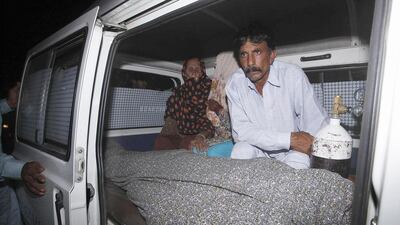LAHORE, Pakistan // The husband of a pregnant Pakistani woman who was beaten to death outside Lahore’s High Court for marrying him against her family’s wishes vowed he would fight for justice.
Farzana Iqbal, 25, was attacked outside Lahore’s grand high court building by more than two dozen brick-wielding assailants including her brother and father, who has been arrested.
Three-months pregnant Farzana had gone to testify in defence of her husband Muhammed Iqbal, who was accused by her relatives of kidnapping her and forcing her into the marriage.
“We demand justice, we were being threatened since we got married,” said Mr Iqbal, from his home village of Jaranwala where he had gone to bury Farzana.
Mr Iqbal, 45, said on Wednesday that he and his wife had survived a previous attack during the first hearing of the case.
“On Tuesday, as we were going to court from our lawyer’s office, almost 30 people attacked us, including her father, brothers and cousins.”
The group of 10 or so people accompanying him were overwhelmed by the suddenness of the attack and fled in all directions, he said.
“One of her brothers shot at her but missed, then the women in their group fell upon her and her brother and father finished her off.”
Mushtaq Muhammed, a police official, said police had arrested Farzana’s father, Muhammrd Azeem, and were seeking five others: two brothers and three cousins.
Despite its gruesome and public nature in Pakistan’s most liberal city, reaction in the media has been relatively muted, indicating a growing apathy within society amid rising extremism, said activists.
“The court’s regular resident police force was mysteriously absent from the scene, unable to take preventive action – or to provide protection or pre-emption to this and countless other foregone and foretold dishonour killing cases,” said Tahira Abdullah, a prominent women’s rights campaigner.
“We are on an irrevocable trajectory towards extremist and un-Islamic interpretations of Talibanised-Islam, to be ‘forcibly and compulsorily enforced’ on us.”
Last year 869 women died in the so-called “honour killings” according to the independent Human Rights Commission of Pakistan. Conviction rates are very low because of Pakistan’s blood-money laws which allow kin to forgive perpetrators, usually family members in such cases.
Mr Iqbal, however, was undeterred.
“There are no hurdles, each and every single individual has been nominated and everybody saw them so there should not be any delay in bringing the perpetrators to justice.”
* Agence France-Presse

